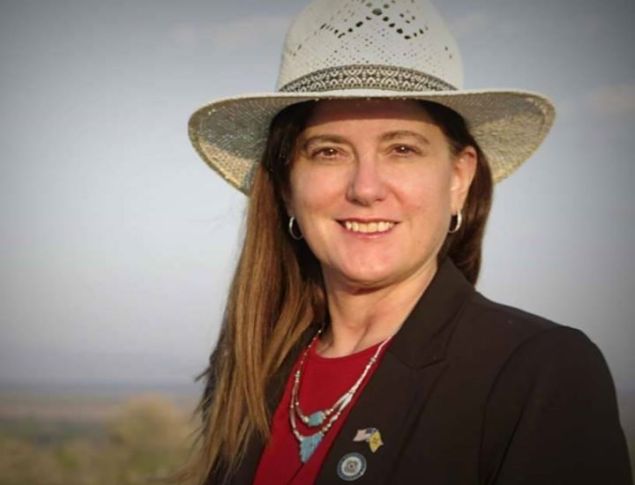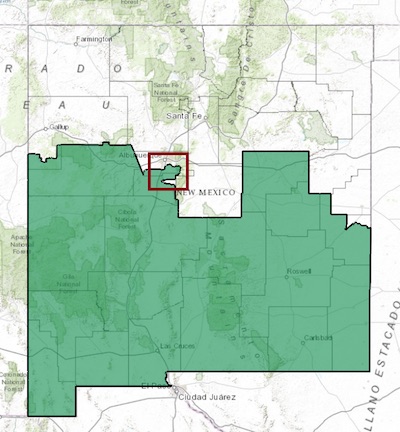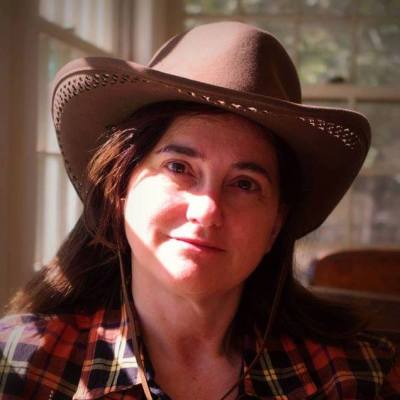On November 13th, I visited Socorro, New Mexico and spoke with Mad Hildebrandt, who is running for Congress in New Mexico's 2nd district. A transcript of our conversation is below.
If after reading this interview you agree with me that Mad is the right candidate for New Mexico, please join me in donating generously to her campaign!
—Maciej Ceglowski
An Interview With Mad Hildebrandt, Candidate For Congress in NM-02

Can you describe your district to people who have never been here?
This district is the fifth-largest in the nation, and it extends from just south of Albuquerque and comes al the way down to the southern border. Extends from Abuquerque in both directions hits both borders and straight down.
The district is split almost exactly in the center by the Rio Grande, and the people who live along the Rio Grande river are a lot of farmers, most of our farming is done along here. The people on the river, the bigger cities along the river, those are the cities that are progressive.

When you go west you see ranchers, when you go east, you see oil; that's the side that resembles West Texas.
We also have a large Native American population, and that is primarily towards the west side of the state.
Really, this is a very conservative district, it's primarily Caucasian, followed by Hispanic (about 40%). We have a very small African-American population (2%), and Native American is maybe 20%.
That's our district. Mostly conservative.
And very beautiful.
And very beautiful. That's what drew me back here.
You're a first-time candidate for Congress, like the other people we're supporting. What was the moment that made you decide "I have to run in this race, and win it"?
I knew I was going to do something, and I didn't know what. When we had the Women's March, I did not go. I was going to go to DC and at the last minute changed my mind, and went to Albuquerque to see what was going on here. I knew I was going to do something, but at that point I didn't know what.
The moment it always goes back to, I was in our Walmart, and I'm down an aisle and this mother comes down the same aisle pushing her cart. This little girl is in the cart—they're Hispanic—and this little girl is looking back beyond me. Someone must have passed her who reminded her of her grandma, because this little girl immediately just tightened up—I thought she had been pinched by the cart—and she just starts crying.
The mother asks her what's wrong, and the little girl says, “Mama, when we get home, is mi abuelita going to be home?”
The mother says, of course she's going to be, why wouldn't she be?
The girls says “Because she's from Mexico.”
This can't happen. A little girl who is 3, maybe 4 at the most should not be feeling that way. There shouldn't be that fear.
When I came back round, because I forgot something in the same aisle, the mother had left the cart there, and taken that little girl home. And I said, “Okay, that's it.” This is the Coast Guard part. I'm going to put myself in between those families that are faacing that, and this law that is unacceptable.
That was the moment. And I decided it had to be Congress, because that's where those laws are made.
You mentioned the Coast Guard. Both you and your husband are veterans.
I spent two years in; he spent thirty. I think I liked being in better than he did, but when I was expecting our first child, I was ill. Pregnancy and me don't get along. We decided that someone was going to get out. I stayed home and took care of the kids, but I used my GI bill, I went to college, got my bachelor's degree on the campus that was on the base. It was in Middle Eastern terrorism. Just because it was interesting, and the professor knew a lot about it.
I lived in San Francisco at the time. I loved it. I went on to get my master's degree, and then on to my PhD, at San Francisco State University, and University of Maine. I studied labor history. I thought the Knights of Labor and "workers of the word unite". stuff was amazing. That's what attracted me to that.
And for my PhD I looked at masculinity as power through professional wrestling.
So you're just a natural fit for this district, yeah? Workers of the world unite, and masculinity as power?
[Laughs] Yes. And then, we're here.
The republican incumbent won with an ample margin the last three times he ran here. This year, it's an open seat. What's your plan to flip this district blue?
My plan is grassroots. Grassroots, grassroots. I have limited funds, but it doesn't matter. What I do is I go out and I hit every town, every small town, and just talk to the people. Every Walmart. I find that's the way that I can reach people best.
Do you see a pattern in what people are telling you? Is there a mobilizing issue in this district, or a sentiment you hear over and over again?
There are two. The first one has to do with the border wall, the idea of the border wall. That this is not something that can happen in this state, to close that border off. We are a primariy agricultural state. When you're dealing with agriculture, there are many jobs people don't want to do. The people that are doing that are coming from across the border.
There are two situations that I usually go back to, that are really extreme to me.
There's a lady who runs a dairy who couldn't get workers this past summer, so she was struggling. She struggled to get the visas she needed to get people over.
The other was a man who is a landscaper, and he also struggled this past summer. He actually had to break contracts for cutting trees, because he could not get workers.
So this is not something that can happen in this district. You cannot close up the border. It would devastate our economy.
The second part of this is education, which again relates to jobs. Our children... our education lags becuase we don't get the money put into education. But when our chidren are educated, where do they go? We don't have the right jobs, the right education, to keep our children here.
So all of these things need to be looked at so we can keep our children here. As our kids graduate, they leave. Especially those kids that go to college. They cannot stay here because we're not working on our economy in conjunction with education.
What can tech workers who are concerned about the direction of the country do to help your campaign?
Money, money, money. That's always a big one.
This district is not a wealthy district, and I do not have connections outside this district. Being military... military people don't have money. And we were enlisted military. A lot of it has to do with just having a source for money.
What I get for my donations here are dollars. What I tell people in this district is—“A buck is enough.” And that's what I run on—a buck.
After you're elected, on your first day in office, what is the key issue you want to fight for?
The first one I want to work on is DACA. Our educated children have to feel safe. I actualy have a plan I want to put into effect. It really is DACA; these educated kids. They're coming here with no path to citizenship. I want to see that these chidren go to high school or college, a lot of them don't even know they're not citizens until something comes up, like financial aid, or a driver's license.
These kids, as they go to school, are taking history and poltical science classes. They should be taking their test for citizenship in school, and when they walk across the high school stage, they should grab that diploma in one hand, and their citizenship in the other.
That's the first thing that I want to do.

Please share this interview with others, and take a moment to donate to Mad's campaign! We can help her flip this vast, majority Democrat district in 2018 if we give her adequate resources in 2017.
You can give up to $2,700 in the primary election, and again in the general election. You must be a U.S. citizen or green card holder to donate. Please give as generously as you can to help us win this pivotal open seat!